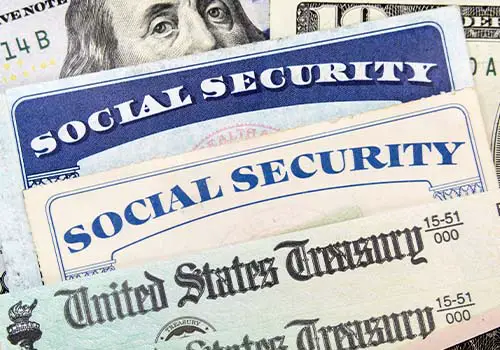Since you pay income taxes on your income throughout your lifetime, you might think that you are done with taxes after that. Unfortunately, that is not always true!
Even upon your death, your assets might still be taxed again when you leave them to your heirs. That tax rate could sometimes be over 40% when combining a federal and state death tax.
While there are exemption amounts in many cases, your heirs could be left with a hefty tax bill if you do not plan appropriately before your death.
Keep reading below to learn all about the death tax, including who pays it, how much it is, and ways to avoid it.
What Is The Death Tax?
“The death tax is any tax levied on property and assets transferred from a deceased person’s estate.”
This includes both the Federal estate tax and state inheritance taxes. A few states also levy estate taxes so that you could get hit with an even larger tax bill in those states.
Upon your death, all the assets in your estate are added together to determine the value of your overall estate. After subtracting any exemptions, the total value of the taxable estate will be left.
- The Federal government charges an estate tax that can be up to 40% of the value of the taxable estate.
- In addition, twelve states also charge an estate tax. These states include Connecticut, Hawaii, Illinois, Maine, Maryland, Massachusetts, Minnesota, New York, Oregon, Rhode Island, Vermont, and Washington. This means that your estate must pay both federal and state estate taxes in those states.
As if that were not enough, six states also impose an inheritance tax on heirs receiving property from the estate. Iowa, Kentucky, Maryland, Nebraska, New Jersey, and Pennsylvania charge an inheritance tax. The District of Columbia has repealed its inheritance tax.
KEY TAKEAWAYS
- Your estate may be subject to federal taxes (death tax) if the value of your estate exceeds the tax exemption levels.
- Several states have an estate tax (death tax), each with unique tax exemption levels and tax rates.
- You can potentially eliminate or minimize your estate tax liability through proper estate planning.
How Much Are The Death Tax Rates
In most cases, the tax rate you pay depends on the value of the decedent’s taxable estate.
Federal Taxes
First, we will discuss Federal estate tax rates. The IRS is responsible for collecting these taxes. At the Federal level, the tax rates exist on a sliding scale, similar to income tax rates.
The higher the estate’s value, the higher the tax rate you will pay. On the low end of the scale, the rates are 18% for taxable amounts less than $10,000. For estates over $1 million, those funds will be taxed at a rate of 40%.
This can add up quickly, so you must account for these taxes during estate planning.
State Taxes
In addition to those Federal taxes, you might also owe state inheritance and estate taxes. These rates range anywhere from 10% to 20%, depending on the estate size. The individual state governments collect these taxes.
Many states allow estate and inheritance tax exemptions. These often apply when the inheritance is left to a surviving spouse or children.
Calculating the value of an estate can sometimes be tricky when the estate holds assets like real estate or even a small business. Often, professionals need to be hired to assist with valuing these assets.
Must read articles related to Trusts
- Overview of “What is a trust?“.
- Deep dive into inheritance tax.
- What are the differences between a revocable and irrevocable trust?
- How does a charitable remainder trust work?
- Learn about the differences between a living trust and a will.
Who Is Responsible For Paying Death Taxes
When it comes time to pay Federal estate taxes with the IRS, the deceased is responsible for paying their estate tax with proceeds from the estate itself.
Federal and State Estate Tax
The estate must file an estate tax return with the IRS per the current tax rules. In 2024, the federal estate tax exemption is $13.61 million. If the total value of the assets held in the estate, plus any prior taxable gifts, is below this value, then no federal tax will be due.
Similiar to Federal estate taxes, the estate must file and pay any state taxes.
Inheritance Tax
Inheritance tax is slightly different. The heirs themselves are responsible for paying the inheritance tax. At the state level, each heir who receives assets from the estate must claim those assets on his or her state tax return.
- Some states allow a married couple to pass assets tax-free to a surviving spouse.
- Often, children can also inherit assets tax-free from their parents.
Since most states do not charge an inheritance or transfer tax, these tax laws only apply to a small portion of Americans. Remember that the state inheritance tax exemptions are pretty low, so you might be responsible for paying taxes even on a small inheritance.
Difference Between Inheritance Tax And Federal Estate Tax
Many people think that inheritance and estate taxes are the same thing. While these are often lumped into what people call death taxes, they are completely separate.
- Estate taxes are assessed at the Federal level, although some states also charge them. They are paid from the estate itself and calculated based on its overall value.
Keep in mind that in 2024, only estates valued over $13.61 million will owe estate taxes to the IRS. So, 99% of people in the U.S. will not have to worry about paying Federal estate taxes.
- Inheritance taxes, on the other hand, are levied at the state level. There is no Federal inheritance tax. This tax is imposed on each heir based on the value of the inherited assets.
The rates range anywhere from 10% – 20%. The exemptions for state inheritance taxes are much lower, so many heirs will be responsible for paying this tax.
TIP
State-specific estate and inheritance taxes are determined by the state where the deceased resided. So, even if your state of residence doesn’t have an inheritance tax, you may still be subject to this tax if you receive an inheritance from someone who resided in another state.
Ways To Avoid Paying Death Taxes
Most people hate paying taxes and want to implement ways to spend as little as possible. Thankfully, there are some ways to avoid paying death taxes or, at minimum, reduce the amount that will be owed.
You should always discuss your plans with an estate planning attorney, but here are a few ways to avoid paying these pesky taxes.
-
Spousal Exemption
One way to avoid Federal estate taxes is by leaving your assets to a surviving spouse. In 2024, the marital deduction is unlimited so that you can pass your assets to your spouse tax-free regardless of the size of your estate. Most states also allow tax-free property transfer to a surviving spouse so that you might end up with a zero-tax bill going this route. Note that the spousal exemption does not apply to non-citizen spouses.
-
Set Up A Trust
Many people set up a trust to help lower their tax bill. Creating an irrevocable trust effectively removes assets from your estate, thereby reducing the overall value of your estate. Some people choose to create intentionally defective grantor trusts or life insurance trusts. You may even decide to name the trust as the beneficiary of a retirement account like a 401k or IRA. Both types of trusts offer practical ways to reduce the amount of estate tax that might become due.
-
Make Gifts During Your Lifetime
Instead of waiting to pass all your assets after your death, begin making gifts during your lifetime. An individual can gift assets up to $18,000 annually, free of the gift tax, and a married couple can gift up to $36,000 annually in 2024. This also helps lower the overall value of your estate upon your death and reduces the amount of estate and inheritance tax that will be owed.
The Bottom Line
As the old saying goes, “Two things in life are certain – death and taxes.” With estate and inheritance tax, both of those are true.
Thankfully, there are ways for taxpayers to avoid or reduce those taxes. Tax credits and other exemptions exist to help lower those tax bills.
However, you should start your planning early. Waiting too late can leave your heirs with a huge tax bill that could have been avoided.
Frequently Asked Questions
No, not every state imposes a death tax. A Federal estate tax applies to estates worth more than $13.61 million.
Only 12 states plus the District of Columbia impose an estate tax.
Six additional states also levy an inheritance tax.
This means that an estate might be required to pay both federal and state estate taxes, and the heirs might also have to pay an inheritance tax.
One pro of the death tax is the fact that it raises a lot of money for the government.
It typically raises hundreds of billions of dollars every few years, and it only affects a very small percentage of Americans.
Given the high exemption threshold, few have estates large enough to qualify for tax payment. More than 99% of people will not be subject to any estate taxes.
One con of the estate tax is that the rate might be as high as 40%.
In addition, most people consider this double taxation. Taxes must be paid on income and capital gains throughout your lifetime, so taxing these same assets at death is essentially taxing the same money twice.
There are also many loopholes in the tax laws that allow some wealthy people to avoid paying many of these taxes.
Typically, estate and inheritance taxes are paid based on the state in which the deceased person lived.
The laws of your state do not usually matter for death tax purposes. So, even if you live in a state without an inheritance tax, you might be forced to pay one if you inherit assets from someone who lived in a state that does impose a death tax.
You can find a Social Security Administration office near you by using our SSA office locator and searching for your closest location.
Estate taxes are calculated based on the value of the assets in the estate minus any exemptions.
Once the total taxable estate is calculated, taxes are based on a percentage of that figure.
Inheritance tax is calculated per beneficiary. The amount of each beneficiary’s inheritance is used to calculate the taxes for that person.





